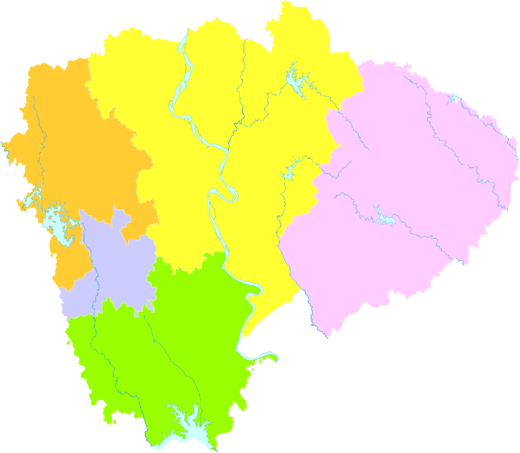Jingmen
| Jingmen 荆门市 | |
|---|---|
| Prefecture-level city | |
.png) Location of Jingmen City in Hubei and the PRC | |
 Jingmen Location in Hubei | |
| Coordinates: 31°03′N 112°12′E / 31.050°N 112.200°E | |
| Country | People's Republic of China |
| Province | Hubei |
| Area | |
| • Prefecture-level city | 12,404 km2 (4,789 sq mi) |
| Population (2012) | |
| • Prefecture-level city | 3,023,000 |
| • Metro | 400,000 |
| Time zone | China Standard (UTC+8) |
| Area code(s) | 0724 |
| GDP | 2013 |
| - Total |
CN¥120.261 billion (US$19.43 billion) |
| - Per capita |
CN¥37,649 (US$6,082) |
| - Growth |
|
| Licence plate prefixes | 鄂H |
| Website |
jingmen |
Jingmen (simplified Chinese: 荆门; traditional Chinese: 荊門; pinyin: Jīngmén; Wade–Giles: Ching1mên2) is a prefecture-level city in central Hubei province, People's Republic of China. Jingmen is within an area where cotton and oil crops are planted. The population of the prefecture is 2,873,687 (2010 population census). The urban area of Jingmen City has a population of about 400,000. Jingmen is so named as in ancient times it was the gateway to Jingzhou, one of the Nine Provinces and means literally Gateway to Jingzhou.
Administrative divisions
Jingmen municipality comprises two districts, one county-level city and two counties :
- Dongbao District (东宝区)
- Duodao District (掇刀区)
- Zhongxiang City (钟祥市)
- Shayang County (沙洋县)
- Jingshan County (京山县)
| Map |
|---|
City layout
Dongbao District "downtown" is located about 3 hours away from Wuhan by bus or rail. A new train service was introduced from Jingmen to Wuhan in 2004. Jingmen is very close to many great tourist attractions such as Changban Slope of Three Kingdoms fame, the Wudang Mountains, and the Ming Tomb in Zhongxiang (a World Heritage site only an hour away). As it is located in central China, Jingmen is within easy reach of almost anywhere in the country, taking about 18 hours to either Beijing or Guangzhou by train, or two hours by train to Yichang, home of the Gezhouba Dam project and Three Gorges Dam. From here travellers can fly to many destinations.
The Dongbao District "downtown" has 3 north-south parallel roads:
- Xiangshan Dadao - The main avenue of Jingmen City. Most governmental buildings are here. Most civil functions, including hospitals, recreational areas, hotels, and the only university in Jingmen - Jingchu University of Technology, are alongside the road.
- Changning Dadao - All big telecommunication companies set up there branches here. Also there are many cellphone shops. The Jingmen railway station is to the north of Changning Dadao.
- Baiyun Dadao - The inner city part of National Highway 207, and a route to the Xiangfan-Jingzhou Highway.
- Jinxia Lu - Not a main avenue, but an important street in the city centre. Lots of small shops and schools there.
Crisscrossing these three roads are the roads Xiangshan 1st to 3rd, so by using these main arteries it is possible to go almost anywhere in Jingmen. Xiangshan 3 road leads behind the Jingmen Foreign Language school and doesn't actually provide a direct link from Xiangshan Dadao to Changning Dadao.
The main commercial area is Zhongtian Street (formerly Jiefang (Liberty) Road), a pedestrian only street, which also crisscrosses the three main roads.
Jingmen is surrounded by hills within easy reach.

Climate
Jingmen has a typical humid subtropical climate, with January the coldest month and July the hottest month. The temperature goes up to 38 °C at noon with uncomfortable humidity in July, but also goes below 0 °C in winter, with snow every year. Rainfall is high in April to September, with less in autumn and winter.
Education
Jingchu University of Technology (Chinese: 荆楚理工学院, JUT), Formerly Jingmen University) founded in early 2007, is the only university in the city of Jingmen. JUT has undergraduate programs on engineering, art, science, management, and nursing.
Notable high schools include Longquan High School, No.1 High School of Jingmen City and Dongbao High School. Longquan High School has a good reputation within Hubei province. Notable middle schools include the private Foreign Language School of Jingmen City, Haihui Middle School and Xiangshan Middle School. Notable primary schools include Jingmen Experimental Primary School, Red Flag Primary School of Jingmen City and Daqiao (Rail Bridge) Primary School.
Transportation
Two expressways go through Jingmen, the Wuhan-Jingmen-Yichang Expressway (part of G42 Shanghai-Chengdu Expressway) and the Xiangyang-Jingmen-Jingzhou Expressway (part of G55 Erenhot-Guangzhou Expressway). The Wuhan-Jingmen section has been completed by 2010. The completion halves traveling time between Wuhan and Jingmen to 2 hours. China National Highway 207 also passes through Jingmen City.
Jingmen is served by the Jiaozuo-Liuzhou Railway and the local Jingmen-Shashi Railway and Changjiangbu-Jingmen Railways. Traveling to Jingmen by railway is convenient, though takes time.
Economy
The economy in Jingmen consists mainly of agriculture and industry. The service sector is not as developed as manufacturing.
Jingmen is an important area for rice, cotton, and rapeseed production. An annual event in late March, Jingmen Rape Petal Tourism Festival, exhibits local agricultural production.
The largest industry in Jingmen is petroleum refining. The Jingmen Branch of Sinopec is a main producer of oil products in central China, refining crude oil extracted from Nanyang Oilfield in Henan province and the Jianghan Oilfield in Hubei province.
Jingmen is a developing logistic hub in central China. Li Ning has set up its largest distribution center in Jingmen, to link southeasten production and consumption from all over China.
Other important industries include power generation, production of agricultural chemicals and cement, metal and electronic waste recycling, and beer-making.
On July 30, 2014 the mayor of Jingmen, Xiao Juhua, signed a Sister City agreement with the rural Canadian township of North Glengarry in Eastern Ontario.
Coordinates: 31°02′37″N 112°12′03″E / 31.04361°N 112.20083°E
